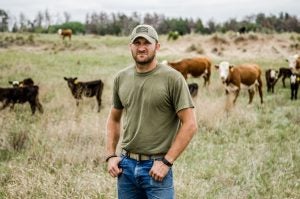Many of the boots on the ground serving our nation’s military began as boots on the farm. A large number of service men and women have roots in rural America and agricultural production. Returning to those roots post-deployment is good for communities, good for agriculture, and good for veterans.
In 2007, Michael O’Gorman organized a meeting in California with area farmers to come up with a plan to create jobs on farms for returning veterans. O’Gorman, a farmer who has spent his lifetime making things grow, now sits at the helm of the Farmer Veteran Coalition overseeing its growth. Over the past near decade, the Farmer Veteran Coalition has grown to include support from agriculture’s strongest voices including American Farm Bureau Federation, Farmer’s Union, and the Farm Credit Council.
The veterans who are successfully working in agricultural production thanks to the coalition span the country and all aspects of agriculture from beekeeping to row crops to produce to dairy cattle. Having once served their country, it is a natural fit for many of them to now serve their country through food production, thereby playing a role in strengthening national security.
The Farmer Veteran Coalition Farming Fellowship awards grant to veterans hoping to build a career in production agriculture. These grants, ranging from $1,000 to a maximum of $5,000 are awarded to veterans to attain a specific item or piece of equipment that can help them grow their farming operation.
“By virtue of becoming one of the fellows, recipients are in the running to win one of four tractors that Kubota, which is a major program sponsor, awards throughout the year,” Communication Specialist Evan Eagan said.

In addition to the Fellowship, training opportunities, and networking opportunities, the Homegrown by Heroes label is also available to participants.
The program, founded by the Kentucky Department of Agriculture, began nationally on Veterans Day 2013. It now has 550 members in 48 states plus Puerto Rico.
“It is a marketing tool for veteran farmer produced items,” said Eagan. “As farmer veterans grow produce and other items, they’re able to differentiate themselves within the marketplace.”
Several state Departments of Agriculture — including Illinois, Indiana, Oklahoma and Louisiana — have officially partnered with Homegrown by Heroes to promote the label in conjunction with their own “buy local” labels.
One of the valuable services available through the program is mentorship from farmers actively involved in production. Eagan explained that oftentimes farmers located near military bases offer their farms as places to experience farming, secure a job, or just a place to find solace in hard work.
Other farmers make themselves available to farmer veterans by flagging themselves as mentors within specific areas of agriculture and the program is able to connect them with a farmer veteran interested in that area.
The Coalition also sponsors a national conference for farmer veterans and supporters of the program. It will be at Michigan State University from Nov. 30 to Dec. 2. There is also a conference specifically for female farmer veterans. Information about the programs and conferences can be found at farmvetco.org.




